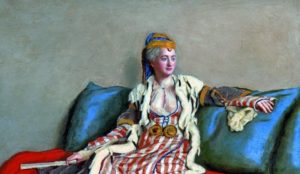Maria Glenn (1801-1866) was a shy young woman living in Regency England who endured criticism and vilification and was stoic in the face of bullying by her numerous powerful enemies.
Maria Glenn, the daughter of a barrister, was born in the West Indies in 1801. She moved to Taunton in Somerset when she was 11, lived in France for two decades as an adult and returned to England when she was in her early forties. On the face of it, her achievements were modest in the extreme, and entirely domestic. She married twice and raised three children but she did not write, travel more than she had to or have an interest in politics. She was a very private, unremarkable person.
Yet, as a teenager, she managed something remarkable: she faced down her numerous enemies and insisted that she was telling the truth about being abducted by a local farming family in 1817.

Photo by unknown, CC BY-SA 2.0
Teenage Maria was everything a young genteel female was supposed to be: unobtrusive, shy, helpful and obedient. She was not pretty (even her uncle, who was devoted to her, said she was plain) but she was a good marriage prospect nevertheless. She was expected to inherit valuable sugar estates in St Vincent when her grandfather died. This expectation made her very interesting to the Bowditch, farmers just outside Taunton, with whom Maria, then aged 15, was sent to lodge in the summer of 1817.
She and two of her young cousins were sent to stay on the Bowditches’ farm to recuperate from whooping cough.
What happened next was the subject of bitter dispute.
Maria later claimed that James Bowditch, the 25-year-old second son, threatened to kill her and then commit suicide if she did not comply with his plan to carry her off and marry her on the isle of Guernsey (which was out of the jurisdiction of English law), and that was the only reason she agreed to leave her uncle’s house in the middle of the night. She was terrified.
James and his family said the whole thing was Maria’s idea and that she had spent the summer flirting and behaving improperly with James, and planning to run away with him to marry. They implied that as a plain girl, she was grateful for the attention.
The problem for them was that while their story changed over time, Maria’s did not.

She stuck to it through a string of stressful court cases, which were reported the length and breadth of the country and never wavered in its detail, even when some of the Bowditches’ powerful friends – including the radical Leigh Hunt of The Examiner – took up their cause against her. Cynical newspaper reporters compared Maria to the infamous teenage liar Elizabeth Canning, whose tall tale some 50 years previously had fooled some of the best brains in the country and who was transported in disgrace to the American colonies, having been convicted of wilful perjury. Posters naming Maria as a liar were pasted up around Taunton. Her few supporters were ‘nobbled’, pressurised into changing sides. Her maid was followed and offered inducements. Both she and Maria wound up in court, sued for perjury, a serious charge which, theoretically at least, could see them pelted with rubbish in the stocks.
How does Maria qualify as amazing?
Her transformation, from an introverted young girl who was so bashful that she hid her face behind a bonnet with a projecting hood, reluctant to endure the stares of strangers, into a young woman determined and able to stand up in public and tell her truth, earns my admiration. She was faced with real adversity and reached down into herself and found a core of strength.
Ironically in this era of increasing openness, I also admire Maria for her ability to sit back, to suppress her past, to put it in a place where others could not reach it. She may have done this to protect herself but she would also have been mindful of her children. Having a notorious liar for a mother, who had a criminal conviction, moreover one who was said to have behaved improperly, would be a serious disadvantage for them.
Even so, she occasionally let slip little references to her experience.
After her daughter told Maria that her estranged second husband had spoken badly of her, she responded with equanimity:
‘You must not, my child, allow your mind to be depressed at the horrid aspersions cast on me by your cruel father. You have learnt to know him now, and can better comprehend the martyr I have been… I can bear much, but to see you unhappy is worse than all to me.’
Maria Glenn could indeed ‘bear much’ – although she did not say so, nothing could have compared to the traumas she had faced as a young woman, when she lost everything: family, home, reputation and friends.
Recommended Reading
Naomi Clifford lives in London and loves to hang out in libraries. She is currently working on her next book, about the women hanged in England and Wales between 1797 and 1837.
The Disappearance of Maria Glenn is published by Pen&Sword and is available at Amazon.com.






Leave a Reply